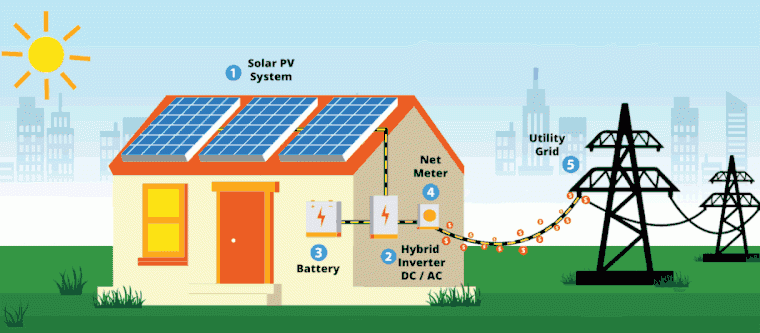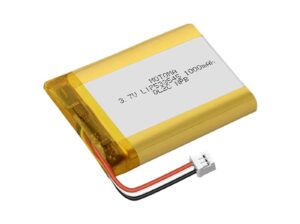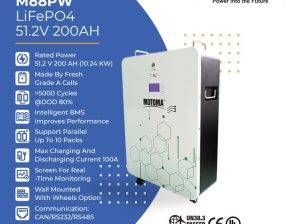The Sun Is Shining: How To Get Started With Solar Power Systems
As the world has become more aware of the devastating effects our activities have on the environment, switching to solar energy is one of the most popular methods to reduce your carbon footprint. In this article, you’ll find out just how easy it is to start with solar power system and why they are such an amazing eco-friendly alternative.
What is a Solar Power System?
A solar power system is a set of technology components that collect energy from the sun and convert it into electrical power. Solar power systems are solar panels, an inverter, batteries, and a charge controller. Solar panels are the primary component of a solar power system, and they are typically mounted on the roof of a home or building. The inverter converts the DC electricity generated by the solar panels into AC electricity that appliances and devices can use in the home or business. Batteries store excess electricity generated by the solar panels to provide power at night or during periods of cloudy weather. The charge controller regulates the flow of electricity from the solar panels to the batteries to prevent overcharging.
Benefits of Solar Power Systems
Solar power systems offer several advantages over traditional energy sources. They are clean, renewable, and efficient. Solar power systems can also be used to generate electricity, which can be used to power homes and businesses. Solar power systems are a great way to save money on your energy bill and are also good for the environment.
The Different Types of Solar Systems
Solar power systems come in various shapes and sizes, from massive solar farms that power entire cities to small solar panels that provide energy for a single home or business. Solar panels convert sunlight into electricity, which can power appliances, lights, and other devices. Solar power systems can be used to offset utility bills or to generate income through the sale of excess electricity.
Large-scale solar farms are usually owned and operated by utilities or companies selling electricity. These farms may cover hundreds of acres and use thousands of solar panels to produce electricity. Solar farms can also generate income by selling excess electricity to the grid.
Small-scale solar power systems are typically installed on rooftops or in open spaces around homes and businesses. These systems are much smaller than solar farms and usually consist of just a few panels. Small-scale solar systems can offset some or all of a home or business’s energy usage and may even generate income through the sale of excess electricity.
How to Choose the Right Solar System?
When it comes to solar power systems, there are a few things to remember to choose the right one for your needs. Here are a few tips:
- Determine Your Energy Needs
The first step is to figure out how much energy you need to generate. This will help you determine the size of the solar system you need.
- Consider the Weather Conditions
The next thing to consider is the weather conditions in your area. If you live in an area with lots of sunlight, then you won’t need as large of a system as someone who lives in a cloudy area.
- Choose the Right Solar Panel Type and Inverter
There are two main types of solar panels: monocrystalline and polycrystalline panels. Monocrystalline panels are more efficient but also more expensive. Polycrystalline panels are less expensive but not as efficient. Consider your budget and needs when deciding which type of panel to choose.
Choose the right Inveter according to your needs, compatible with your PV system and Backup Battery Storage.
- Get Several Quotes
When you’re ready to start, contact several companies for quotes on their products and services. This will help ensure you get the best deal on your solar power system purchase and installation.
Installation Tips and Requirements
Before you can start generating your solar power, there are a few things you need to take care of. First, you’ll need to research and determine if solar power is feasible for your home. This includes considering the sunlight your home receives, the size and angle of your roof, and any shading from trees or other buildings. Once you’ve determined that solar is right for you, the next step is to choose the right system. There are a few different types of solar power systems available on the market, so selecting one that will meet your specific needs is essential. Finally, you’ll need to install the system. This process will vary depending on the type of system you choose, but a qualified professional can complete most installations in just a few hours.
Maintenance and Safety Guidelines
Assuming you’ve already decided to go solar, congratulations! Solar power systems can be an excellent way to reduce your reliance on fossil fuels and save money on your energy bills.
Now that you’re ready to take the next step, it’s essential to understand a few critical things about solar power systems before you get started. This includes understanding basic maintenance and safety guidelines.
First and foremost, it’s important to have your solar power system inspected and maintained by a qualified professional regularly. This will help ensure that your system is operating at peak efficiency and identify potential issues before they become more significant problems.
In addition, it’s important to be aware of some fundamental safety concerns when working with solar power systems. For example, always use caution when working with solar panels or electrical wiring, and never enter a roof-mounted solar panel array without proper safety gear. If you have any questions or concerns about solar power system maintenance or safety, consult a professional before taking action.
Conclusion
When it comes to solar power systems, we hope that this article has given you enough information to feel confident in making the switch. Solar power is one of the most sustainable and efficient energy sources, meaning you’ll be doing your part for the planet and your wallet. Plus, with technological advances and renewable incentives often available, why not turn off the traditional sources of electricity generation? So spread some sunshine and start your journey towards a greener future today!
Comments (9)
You must be logged in to post a comment.




[…] you’ll need to make sure that your solar energy system is connected to your local power grid. This will allow you to take advantage of government […]
[…] result of an individual’s or organization’s activities. It is used as a way to measure the environmental impact of activities that cause climate change, such as burning fossil fuels or cutting down trees. Carbon […]
[…] main advantage of 48V solar systems is their efficiency. They are able to convert more of the sun’s energy into usable electricity than 24V systems. This is due to the fact that they have fewer components and less loss of energy through heat. In […]
[…] on your energy bill. Solar panel installation is quick and easy and can be done by anyone. Solar power systems are a great way to reduce your carbon footprint Solar energy installations can provide you with […]
[…] the grid, but some challenges come with it. The biggest challenge is installing the system. Solar power systems can be expensive, and you need to ensure you have the right tools and supplies before you start. […]
[…] of the battery is one of the most important considerations. This will determine how long the system can run during a power […]
[…] most obvious benefit of solar street lighting is the cost savings associated with it. As solar energy is produced from the sun, there are no fuel costs associated with it. This means that businesses can save money on their […]
[…] a cathode. The anode is made up of lithium, and the cathode is made up of a metal oxide. When the sun hits the solar cells, it causes the electrons in the anode to flow to the cathode. This creates an electric […]
[…] energy sources available. Lithium batteries are becoming increasingly popular as a way to store solar energy for use when the sun isn’t […]